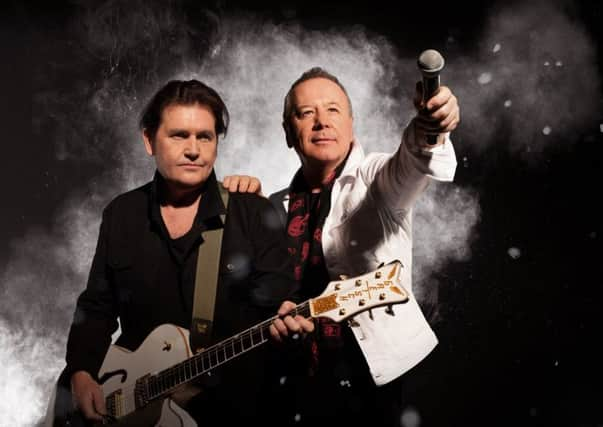Album reviews: Simple Minds | Francis Macdonald | Hollie Cook


Simple Minds: Walk Between Worlds (BMG) ***
Francis Macdonald: Hamilton Mausoleum Suite (TR7/Shoeshine Records) ***
Hollie Cook: Vessel of Love (Merge) ****
Their days as one of the world’s biggest stadium rock bands may be behind them but as Simple Minds pass their 40th birthday, founding members Jim Kerr and Charlie Burchill have succeeded in striking a balance between the old and the new – regularly celebrating their back catalogue, cleaning right into the corners as well as honouring the big hits, while also showcasing their enthusiasm for new material.
Advertisement
Hide AdThe Big Music was well received in 2014 as an album which affectionately claimed the arena rock heritage that made them such a big noise in North America in the mid-80s but also burrowed further back to their Europe-facing art rock roots. Walk Between Worlds sets out to perform a similar balancing act with an economy they have not always deployed – eight tracks in 40 minutes.
The title is not the only thing the elegantly epic Magic shares with Coldplay, who are the pale 21st century imitation of the U2/Simple Minds axis. This meditation on belief, particularly self-belief, retains some of the skyscraping guitar heft of old but, not for the last time, Kerr holds back on the vocals somewhat and the track remains tethered.
Summer opens with the hum of synths and a percussive drive which bursts forth into a revving cauldron of contained energy. Kerr’s moody vocal breaks out into a semi-celebratory chorus “here comes summer, here comes rain” in the knowledge that the two go hand in hand for the home fans.
With its abstract swirls of synths, Utopia is a more slippery mix of pomp and pop with no hooks to hang on to, but there’s a stronger thrust to The Signal and the Noise, an exhortation to engage which captures some of that New Gold Dream scale, while In Dreams is bolstered by the soulful gospel backing vocals of their mid-80s heyday.
Barrowland Star is their most unapologetically nostalgic number, paying tribute to the ballroom they helped re-open as a gig venue in 1983 and to which they will return again in a matter of days. Kerr puts on his best Bowie croon for this special place, wreathed in cinematic strings, and then Burchill digs in with some mighty rock riffing.
Similar elements combine on the beefy title track, but fail to come together to produce an arresting song. In fact, they have to burrow back more than 30 years for a tune – Sense of Discovery blatantly references the melody of Alive and Kicking, rounding off an album which looks back in fondness rather than makes an impression on the present.
Advertisement
Hide AdIn contrast, Francis Macdonald continues to forge forwards. The Teenage Fanclub drummer, band manager, record label owner and TV composer releases his second album of classical music, a chamber suite for string quartet and harp, recorded in the famously sonorous acoustics of the Hamilton Mausoleum in Strathclyde Park, which inspired the gossamer touch of Whispering Walls, fragrant pastoral passages Half Past Midnight, the haunted, unsettling One Foot Then Another and folk melody of Stone Lions Lullaby.
Jamaican dancehall continues to exert its influence on the pop charts through a slew of grime and R&B singles, while the less abrasive sounds of roots reggae are somewhat neglected. Perhaps this is why Hollie Cook, daughter of Sex Pistols drummer Paul, is such a breath of fresh air. Vessel of Love is her third solo album, and a bittersweet joy from start to finish, encompassing the laidback lovers rock, dub vibrations and resonant pedal steel of Survive, space dub and sultry vocals of Lunar Addiction and Minnie Riperton-style psychedelic soul on Turn It Around.
CLASSICAL
Symphonic Psalms & Prayers (Signum Classics) ****
Advertisement
Hide AdThe Psalms have inspired some of the greatest religious choral settings in musical history. The liquid vocal ensemble Tenebrae, supported by the BBC Symphony Orchestra, turn to relatively recent examples in a programme of music that encompasses well-known settings of Bernstein and Stravinsky, as well as less frequently heard versions of Schoenberg and Zemlinsky. They open with the raw, intense neoclassicism of Stravinsky’s Symphony of Psalms, and a performance that is almost unnerving in its directness. Schoenberg’s Friede auf Erden, a sumptuous example of his early post-Brahmsian harmonic style, offers quilted respite, before we enter the sugary religiosity of Bernstein’s Chichester Psalms, albeit heightened by the drama of the final movement, from its steely string opening to the sentimentality of Adonai. Zemlinsky’s setting of Psalm 23 beckons us to the world of post-Mahler delirium.
Ken Walton
JAZZ
David Series: Meerkat Parade (Own Label) ****
The first sound on this debut album by Edinburgh-based guitarist David Series is the resonant double bass of James Lindsay, before slide guitar sighs in, accompanied by keyboard player Huw Rees and drummer Max Popp. Following that brief opener, Rees provides some ambulatory piano ranging through Mr Frisbee while things really start to shift halfway through Oink (tune titles tend to be as enigmatic as that of the album), when the whole quartet powers into a hypnotic groove, guitar searing out from time to time.
The tuneful Hermwei sees guitar and piano step out in engagingly conversational mode, while there’s some brief but eloquent sounding from Series and Lindsay in Where’s Waltzy? The closing Scoobie Snack once again sees the band build up a head of steam, with intense riffing from organ and guitar while Popp’s drums kick up a stir. There’s great listening here but also a certain restraint: I’d love to hear them live. n
Jim Gilchrist